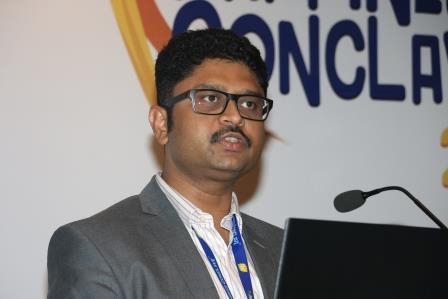Happy customers are made by happy employees. Hence, process experience for employees has to be that simple too. Sanchayan Paul, head of rewards–effectiveness and change, Vodafone, shares the secret recipe behind ensuring employee happiness at the workplace.
Happy people make happy organisations, but some companies are seen as happier places to work as compared to others. Why? Because there is a secret sauce that goes in—something special that these organisations do to ensure a happy and engaged workforce.
At The Happiness Conclave 2.0, held at Taj President, Mumbai on March 24, Sanchayan Paul, head of rewards–effectiveness and change, Vodafone, shares the secret recipe behind ensuring employee happiness at the workplace.
“Happiness is a journey, not a status that a company can achieve. You can only make efforts to build a happy set of employees,” Paul says. With its motto to be the most loved telecom service provider in India, the company also looks to delight its internal stakeholders—the employees. Paul shares that similar to customers, employees also have changing expectations and that organisations need to make efforts to keep pace with that changing target and live up to it.
“F1 drivers do not distinguish between themselves and the car. They are in the here and now. Similarly, employees should not distinguish between the job and the company.”
Explaining why Vodafone measures Net Promoter Score (NPS), not just for its customers but its employees too, Paul says, “Happy customers are made by happy employees. Hence, process experience for employees has to be that simple too.” Paul explains that a high engagement score does not necessarily lead to business performance, but it is a combination of that with the Manager Index (how you perceive your manager treats you, coaches you, enables you to be upskilled); and softer areas, such as culture or how people experience Vodafone.
Paul further explained what psychologists typically identify happiness with, as he shared the same in crisp points:
• Pleasure—hope, contentment
• Engagement— Extent to which one can deploy one’s talent and use skills on the job; show how much of oneself one brings to work every day.
• Meaning— urge to do something bigger; desire to impact beyond the organisation and beyond the area of influence, such as the job.
Building up an analogy from a picture of F1 racing, in his presentation, Paul shared that “Really good drivers do not distinguish between themselves and the car. They are in the here and now.” Similarly, he believes that employees should not distinguish between the job and the company. HR folks, on the other hand, look for ‘Job–Person Fit’.

Vodafone ensures happy employees through various conscious efforts and initiatives, such as impacting communities through product creation, World of Difference, Giving Championship, Raise Your Hand, apart from opportunities across 18 business units, 400 + locations in India, and international assignments and projects.
Paul shares that Employer Value Proposition (global; 8 propositions created through FGDs and surveys across 96,000 employees in 30 countries). He shared that Vodafone also uses structured (regression and other analyses) data and unstructured data (patterns of car usage, use of maternity leave policy, and so on, along with response and feedback during town halls and gatherings) to ensure employee wellbeing.
He explained how a shared economy can boost required behaviours inducing happiness and satisfaction in the workforce. He mentioned people using Uber instead of buying cars and using Airbnb instead of hotels. “How can we deliver shared experiences with rewards and recognition,” he asked as he spoke of managing total rewards for employees.
Covering a range of employees that exist in the current multigenerational workplace, Paul also shared that there is a need to focus on subsegments, framing policies that can accommodate different subsegments. He says, “There is a need to introduce policies for aging employees along with millennials.” He explained further that the reward incentives give structural inputs on how they’re doing on Hot Skills, Life-stage and Life-style issues, such as aging parents, children in classes 10th and 12th.
In addition, Vodafone provides break flexibility and opportunity to take 3–18 month sabbaticals, also allowing people part-time work and pro-rata earnings. It has solutions, such as PayFlex to help it optimise earnings to help its net income go up.
The company has also invested hugely in healthcare for its employees, using insights from the analytics of three years’ data to develop a customised medical insurance policy, which ensures career, social and community well-being. It also offers insurance for the employees’ families.
Having shared that, Paul beautifully concludes saying, “One needs both mental and financial well-being to be able to focus on one’s F1 racing.”
(Sodexo, Art of Living Corporate Programs, XLRI, NHRDN Pune, NHRDN Mumbai, XoxoDay and Kommune are partners for The Happiness Conclave).




1 Comment
I m Ex-employee of Voda Raj. As a employer voda is great organization to work. If I got Chance to join again voda I can.
Paul Boss we miss you.